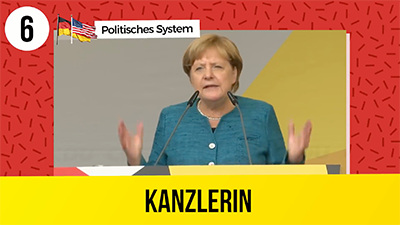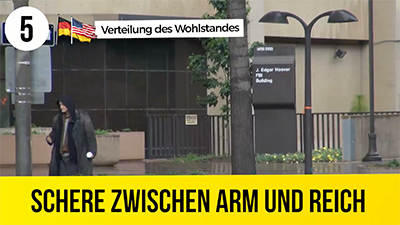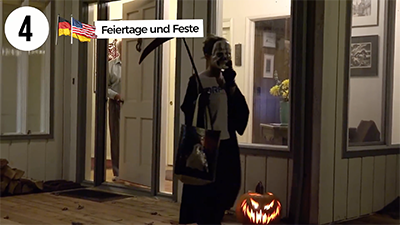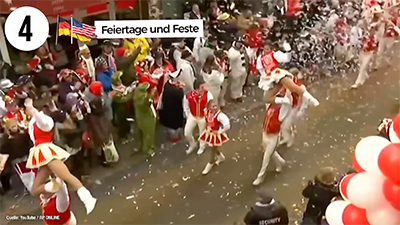| Seite 6 |
Übung 9-6a: video Deutschland vs USA Teil 2 (On BOLT under "Assignments")
- Predict:
__________________________________________________________________________________________________________________________________
- Observe:
__________________________________________________________________________________________________________________________________
- How do you think the USA and the BRD compare in these areas of culture? What main differences seem to be illustrated?
Does the video favor one side over the other in any area?
__________________________________________________________________________________________________________________________________
- Watch the second video with the subtitles without pausing. Do not look up any words. What additional information can you gather?
__________________________________________________________________________________________________________________________________
Deutschland und die USA im Vergleich 2
Deutschland und die USA im Vergleich 2 mit Untertiteln






Wortstellung in deutschen Sätzen
Linguistic discourse generally includes four main categories of sentence:
- statement (declarative)
- question (interrogative)
- command (imperative)
- exclamation (exclamatory)
- A statement expresses information as
- a state of being: Mein Vater ist Lehrer.,
- an action: Ich gehe in die Schule.,
- a process: Das Wasser kocht.
- A question elicits information by
- seeking the veracity of a situation, that can be answered by ja or nein and does not use an interrogative pronoun or adverb: Gehen Sie jetzt nach Hause?;
- seeking specific information, requiring an interrogative pronoun or adverb: Wem gehört das Buch? Warum kommst du nicht?
- A command requests a certain behavior or action from another person or persons: Helft uns!;
- Commands may include the speaker: Gehen wir ins Kino! (Let's go to the movies!)
- An exclamation is a spontaneous utterance that expresses a feeling or situation, implies a listener, and is also indicated by an exclamation mark: Wie schön es hier ist!
The declarative sentence may consist of
- one clause: Ich studiere im Winter in Berlin.
- two or more clauses in a compound sentence with two independent clauses: Ich studiere im Winter in Berlin und schreibe dort meine Doktorarbeit.
- two or more clauses in a complex sentence with an independent (main) and one or more dependent (subordinant) clauses. Dependent clauses provide supplementary information to the main clause and cannot stand by themselves. Ich studiere im Winter in Berlin, wenn ich ein Stipendium bekomme.
Word Order
The characteristic feature of the German sentence is the split predicate. Any verbal concept that consists of two or more units is divided and occupies two separate positions in the main clause. Verbal concepts that contain two or more units include- verbs with separable prefixes
- modal constructions
- future tense
- present perfect tense (Kapitel 10)
- passive voice (Kapitel 12)
- subjunctive mood with würde (Kapitel 11)
- other past tenses (past perfect, past subjunctive, etc.)
- In imperativ sentences and interrogative sentences seeking the veracity of a situation, answered most often with ja or nein, the two parts of the predicate occupy the front and
rear limits of the sentence field.
V1 ....................sentence field................. V2 Können Sie mich verstehen? Steh morgen um sechs Uhr auf! Wird Hans heute mit dir ins Kino gehen? - In complex sentences the front limit of the dependent clause is occupied by a connecting link (C), such as conjunctions weil or wenn.
In such cases, the entire predicate is placed at the end of the sentence field with the uninflected part (V2) first followed by the inflected part (V1).
C ....................sentence field................. V2 V1 ...weil Hans heute ins Kino gehen will. ...wenn der Zug rechtzeitig nach Hamburg an kommt. ...dass die Lehrerin morgen nicht zur Schule kommen wird *For separable prefix verbs, the prefix is joined to the inflected verb: ...wenn der Zug rechtzeitig nach Hamburg ankommt.
- Declarative sentences normally have one sentence unit preceding the first part of the predicate. A variety sentence units may occupy the prefield:
subject, object, expressions of time or place, an adverb, but ONLY ONE sentence unit may occupy the prefield.
If the subject of the declarative sentence does not occupy the prefield, then the subject MUST FOLLOW THE FIRST PART OF THE PREDICATE.
Prefield V1 ....................sentence field................. V2 Hans geht heute abend ins Kino. Heute abend geht Hans ins Kino. Ins Kino geht Hans heute abend. Der Zug kommt um 5 Uhr in München an Um 5 Uhr kommt der Zug in München an In München kommt der Zug um 5 Uhr an Er will morgen mit mir nach Köln fahren Morgen will er mit mir nach Köln fahren Mit mir will er morgen nach Köln fahren Nach Köln will er morgen mit mir fahren Das Kind isst den Kuchen zum Frühstück gern Den Kuchen isst das Kind zum Frühstück gern Zum Frühstück isst das Kind den Kuchen gern - Note the differences between German and English word order:
English: He never works. - Er arbeitet nie.
- Nie arbeitet er.
English: The child eats the cake. - Das Kind isst den Kuchen.
- Den Kuchen isst das Kind.
- Dependent clauses may occupy the prefield of a complex sentence.
Prefield Main Clause C ....................sentence field................. V2 V1 V1 ....................sentence field................. V2 Weil Dagobert kein Fleisch mehr essen will, kauft er nie in der Metzgerei ein - Dependent clauses often occupy the POSTFIELD of a complex sentence.
Main Clause POSTFIELD Prefield V1 ................sentence field............. V2 C ................sentence field............ V2 V1 Kristin wird am Wochenende ein Referat schreiben, weil sie nächste Woche keine Zeit haben wird - For informational questions, the interrogative pronoun, interrogative adverb, or interrogative phrase occupies the prefield.
Prefield V1 ....................sentence field................. V2 Wen willst du morgen besuchen? Was werdet ihr in Köln tun? Wann kommt der Zug hier an? In welcher Stadt wohnt ihr Freund ? - In compound sentences, clauses connected with conjunctions und, aber, oder, sondern, denn are independent clauses and the conjunctions do not affect word order.
- The conjunction sondern shows contrast, contradiction, or an opposite and must follow after a negative statement: Er ist nicht dumm, sondern intelligent. (The noun and verb in the "sondern" clause are implied in this example.)
- In the construction nicht nur ... sondern auch, sondern shows additional information and not show a contrast, contradictiion or opposite: Er ist nicht nur dumm, sondern auch arrogant.
- The conjunction denn indicates the reason or cause for a previous statement: Robert muss Deutsch lernen, denn er will in Deutschland studieren.
- When several modifiers appear in the sentence field, they usually follow the order of TIME, MANNER, PLACE: Ines will heute (time) schnell (manner) nach Hause (place) fahren.
Übung 9-6a (In BOLT)
- One or more __________________ comprise a discourse.
- Which is correct? ______ Clauses consist of sentences. _____ Sentences consist of clauses.
- An event or state of being that determines the logic and structure of a clause: ____________________________.
- Expresses information regarding state of being, action, or process: _________________________.
- Elicits the veracity of a situation or specific information: ______________________________.
- Requests behavior or action from another person: _______________________________.
- The central difference between English and German word order: ______________________________.
- The types of statement structured as V1 .....sentence field..... V2 [postfield]
C .....sentence field..... V2 V1 : ________________________.
- The type of statement structured as [prefield]V1 .....sentence field..... V2: ________________________.
- Change the prefield. Example: Hans geht heute abend ins Kino. (ins Kino) → Ins Kino geht Hans heute abend.
- Der Zug kommt um 5 Uhr in München an. (in München) →
__________________________________________________________________________________________
- Mein Onkel und meine Tante wollen am Sonntag mit uns im Café essen. (mit uns) →
__________________________________________________________________________________________
- Der Supermarkt wird heute um 12:00 Uhr für Reparaturen schließen. (für Reparaturen) →
_________________________________________________________________________________________
- Der Zug kommt um 5 Uhr in München an. (in München) →
Übung 9-6b (In BOLT) Create sentences from the elements using the order of the clauses as indicated in parentheses.
Beispiel: Fritz / einkaufen / nie / in der Metzgerei // weil / Fritz / kein Fleisch / wollen / essen (dependent clause in prefield) → Weil Fritz kein Fleisch essen will, kauft er nie in der Metzgerei ein. (Watch verb agreement and cases!)
- Wir / ankommen / um 11:15 Uhr / in Bielefeld // wenn / wir / mit dem Zug / um 9:00 Uhr / abfahren (dependent clause in prefield) →
_________________________________________________________________________________________________________________________________________
- Siegfried / möchte / mitbringen / sein Freund Jan / auf die Party // weil / sein Freund Jan / nicht wollen / bleiben / zu Hause (dependent clause in postfield)
→
____________________________________________________________________________________________________________________________________________
- Die Kinder / werden / gehen / morgen / nicht in die Schule // weil / die Kinder/ werden/ machen / ein Ausflug / mit ihrer Lehrerin / (dependent clause in prefield) →
___________________________________________________________________________________________________________________________________________
- ich / können / spielen / Klavier / besser // wenn / ich / müssen / üben / für ein Konzert (dependent clause in postfield) →
___________________________________________________________________________________________________________________________________________
- Das Seminar / anfangen / heute / spät // weil / der Professor / müssen / warten / auf / seine Kollegin (dependent clause in prefield) →
___________________________________________________________________________________________________________________________________________
- das Publikum / müssen / bleiben / still // wenn / das Konzert / anfangen (dependent clause in postfield) →
___________________________________________________________________________________________________________________________________________